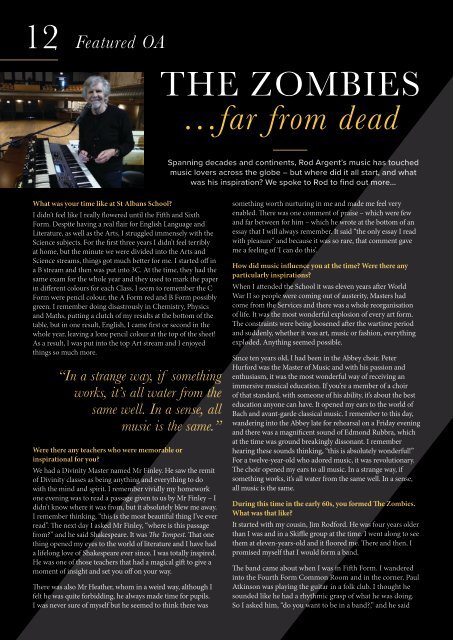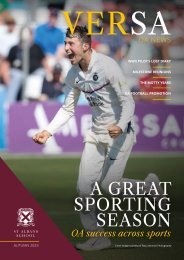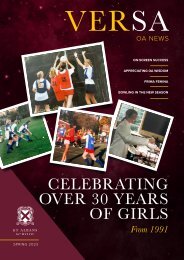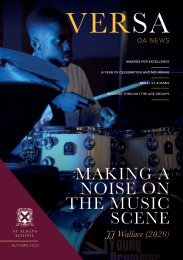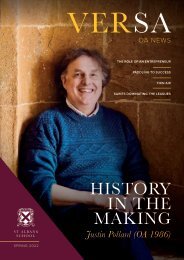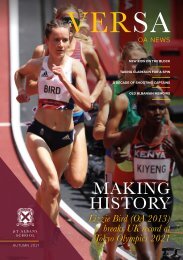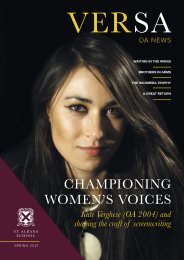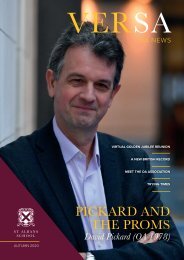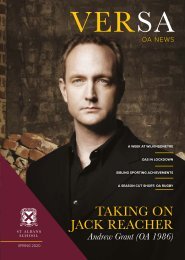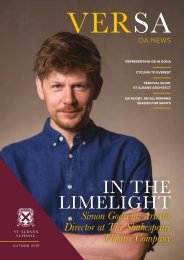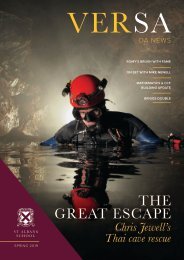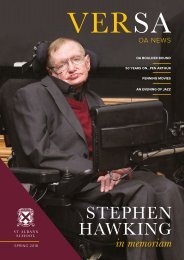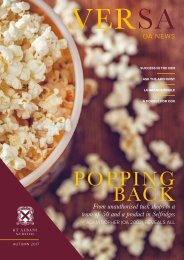Versa: Issue Three
Versa is a biannual publication and will be published every autumn and spring term. Versa has replaced the former magazine, OA Bulletin and will offer a comprehensive insight into the many facets of alumni life.
Versa is a biannual publication and will be published every autumn and spring term. Versa has replaced the former magazine, OA Bulletin and will offer a comprehensive insight into the many facets of alumni life.
Create successful ePaper yourself
Turn your PDF publications into a flip-book with our unique Google optimized e-Paper software.
12<br />
Featured OA<br />
13<br />
What was your time like at St Albans School?<br />
I didn’t feel like I really flowered until the Fifth and Sixth<br />
Form. Despite having a real flair for English Language and<br />
Literature, as well as the Arts, I struggled immensely with the<br />
Science subjects. For the first three years I didn’t feel terribly<br />
at home, but the minute we were divided into the Arts and<br />
Science streams, things got much better for me. I started off in<br />
a B stream and then was put into 3C. At the time, they had the<br />
same exam for the whole year and they used to mark the paper<br />
in different colours for each Class. I seem to remember the C<br />
Form were pencil colour, the A Form red and B Form possibly<br />
green. I remember doing disastrously in Chemistry, Physics<br />
and Maths, putting a clutch of my results at the bottom of the<br />
table, but in one result, English, I came first or second in the<br />
whole year, leaving a lone pencil colour at the top of the sheet!<br />
As a result, I was put into the top Art stream and I enjoyed<br />
things so much more.<br />
“In a strange way, if something<br />
works, it’s all water from the<br />
same well. In a sense, all<br />
music is the same.”<br />
Were there any teachers who were memorable or<br />
inspirational for you?<br />
We had a Divinity Master named Mr Finley. He saw the remit<br />
of Divinity classes as being anything and everything to do<br />
with the mind and spirit. I remember vividly my homework<br />
one evening was to read a passage given to us by Mr Finley – I<br />
didn’t know where it was from, but it absolutely blew me away.<br />
I remember thinking, “this is the most beautiful thing I’ve ever<br />
read”. The next day I asked Mr Finley, “where is this passage<br />
from?” and he said Shakespeare. It was The Tempest. That one<br />
thing opened my eyes to the world of literature and I have had<br />
a lifelong love of Shakespeare ever since. I was totally inspired.<br />
He was one of those teachers that had a magical gift to give a<br />
moment of insight and set you off on your way.<br />
There was also Mr Heather, whom in a weird way, although I<br />
felt he was quite forbidding, he always made time for pupils.<br />
I was never sure of myself but he seemed to think there was<br />
THE ZOMBIES<br />
…far from dead<br />
Spanning decades and continents, Rod Argent’s music has touched<br />
music lovers across the globe – but where did it all start, and what<br />
was his inspiration? We spoke to Rod to find out more…<br />
something worth nurturing in me and made me feel very<br />
enabled. There was one comment of praise – which were few<br />
and far between for him – which he wrote at the bottom of an<br />
essay that I will always remember. It said “the only essay I read<br />
with pleasure” and because it was so rare, that comment gave<br />
me a feeling of ‘I can do this’.<br />
How did music influence you at the time? Were there any<br />
particularly inspirations?<br />
When I attended the School it was eleven years after World<br />
War II so people were coming out of austerity, Masters had<br />
come from the Services and there was a whole reorganisation<br />
of life. It was the most wonderful explosion of every art form.<br />
The constraints were being loosened after the wartime period<br />
and suddenly, whether it was art, music or fashion, everything<br />
exploded. Anything seemed possible.<br />
Since ten years old, I had been in the Abbey choir. Peter<br />
Hurford was the Master of Music and with his passion and<br />
enthusiasm, it was the most wonderful way of receiving an<br />
immersive musical education. If you’re a member of a choir<br />
of that standard, with someone of his ability, it’s about the best<br />
education anyone can have. It opened my ears to the world of<br />
Bach and avant-garde classical music. I remember to this day,<br />
wandering into the Abbey late for rehearsal on a Friday evening<br />
and there was a magnificent sound of Edmond Rubbra, which<br />
at the time was ground breakingly dissonant. I remember<br />
hearing these sounds thinking, “this is absolutely wonderful!”<br />
For a twelve-year-old who adored music, it was revolutionary.<br />
The choir opened my ears to all music. In a strange way, if<br />
something works, it’s all water from the same well. In a sense,<br />
all music is the same.<br />
During this time in the early 60s, you formed The Zombies.<br />
What was that like?<br />
It started with my cousin, Jim Rodford. He was four years older<br />
than I was and in a Skiffle group at the time. I went along to see<br />
them at eleven-years-old and it floored me. There and then, I<br />
promised myself that I would form a band.<br />
The band came about when I was in Fifth Form. I wandered<br />
into the Fourth Form Common Room and in the corner, Paul<br />
Atkinson was playing the guitar in a folk club. I thought he<br />
sounded like he had a rhythmic grasp of what he was doing.<br />
So I asked him, “do you want to be in a band?,” and he said<br />
yes! Then, I needed a drummer. That very week I went to a<br />
marching display of the Corp and while they were playing,<br />
I picked out the guy who I thought had the best sense of<br />
rhythm on the drum, and I asked him afterwards, “do you<br />
want to be in a band?,” and he said…yes! I then spoke to a<br />
good friend of mine, Paul, who was building a bass. He had<br />
never played before but I said, “You’re in the band!.” A day<br />
later, he invited his friend who played rhythm guitar to the<br />
first rehearsal, and that was it. We learned as we went along<br />
and we were incredibly enthusiastic. Paul, who built the bass,<br />
less so, so he left to pursue becoming a doctor, which he did<br />
with great success. Chris White, then joined us.<br />
Jim Rodford was wonderfully helpful driving me to rehearsals.<br />
At the time, we met at the Blacksmith’s Arms but I was too<br />
young to go inside so we practiced at the Pioneer Club on<br />
Hatfield Road. He loaned us all the Bluetones’ gear. We thought<br />
we were pretty hot but Jim told me afterwards, he thought we<br />
had no chance!<br />
“You only have one life.<br />
Embrace what is opening your<br />
eyes – nothing is guaranteed.”<br />
We won the Beat-Group competition run by the London<br />
Evening Standard and the prize was a recording contract for a<br />
single. I’d written, It’s Alright With Me which appeared on our<br />
first EP and our first hit, She’s Not There.<br />
Fast-forward to 1969 and The Zombies have disbanded and<br />
you formed Argent. How did you find this transition?<br />
I believe the first two Argent albums were an absolute<br />
progression from The Zombies Odessey and Oracle. The<br />
first real success we had internationally was the album All<br />
Together Now which had Hold Your Head Up on it, a top-5 hit<br />
everywhere. By this time in 1972, musically, we had moved<br />
in a different direction. Like everyone, we were constantly<br />
trying new things. We were hungry to explore all music from<br />
Pierre Boulez to musique concrète and everything in-between.<br />
We didn’t want to stand still, look back and simply rake over<br />
the embers. We thrived on creative energy which sometimes<br />
worked and sometimes didn’t. Each album after All Together<br />
Now became a tapestry of different successes.<br />
What are you doing now?<br />
I’m very proud of the last album we did in 2015. We had a<br />
call from Billboard magazine who wanted us to know that for<br />
the first time in fifty years, we had entered the top 100 album<br />
sales chart. We were knocked out. It is so gratifying that at<br />
the age of seventy-three, we still seem to relate to audiences<br />
who have both followed us all the way through, and a sizable<br />
portion of younger audiences too.<br />
Do you have any advice for current pupils?<br />
I would say always look for the centre of yourself, try to<br />
embrace the knowledge you are gaining and learn with<br />
passion, rather than as a means to an end. I believe<br />
that’s true with everything. You only have one life. Embrace<br />
what is opening your eyes – nothing is guaranteed. I made a<br />
very good group of friends at St Albans School who I lost touch<br />
with for a while but we reconnected recently. I don’t think any<br />
of us distinguished ourselves academically, but everybody in<br />
that group has had success in one way or another, whether<br />
commercial or not. I believe this is one of the great qualities the<br />
School imbued us with; really learning how to apply ourselves.<br />
Many people have talent, but it is the quality of seeing<br />
something through and applying yourself, trying hard enough,<br />
and for long enough, that is a real quality.<br />
Has anyone caught your eye in the music industry today?<br />
We had a track on the last Eminem album where he sampled<br />
Time of the Season. He did something very clever with it, taking<br />
the phrase, “it’s the time of the season for loving” and inverted<br />
the sense of it completely, changing it to “there’s no rhyme or<br />
reason for nothing”. I really enjoyed it in the sense he wasn’t<br />
just using the song for something gratuitous. He changed the<br />
meaning totally.<br />
What has been the highlight of your career so far?<br />
I had initial success with the Zombies, then came off the road<br />
in 1975 which I thought was for good. I became involved with<br />
Andrew Lloyd Webber for many years, and he even asked a<br />
few of us to do the first five weeks of Cats! I have written for<br />
television, produced albums and in spite of all this, when Colin<br />
and I got back together in 2000, it surpassed all expectations.<br />
We were supposed to do six gigs for fun but this gained<br />
momentum and became eighteen years of travelling around the<br />
world! I adored the buzz of playing again.<br />
The music scene has changed so much and we are so proud of<br />
having built something so substantial at this late stage in our<br />
careers. After a recent gig, Graham Nash (The Hollies) came up<br />
to us and said, “who would have thought, fifty years ago when<br />
we played together, not only would we still be so enthused by<br />
making music, but we would also be making new music and<br />
playing to these audiences!” Yet here we are. In a funny way,<br />
that’s what Colin and I are most proud of, that we have built up<br />
this second incarnation from nothing, into something that in a<br />
way, has been more successful.


